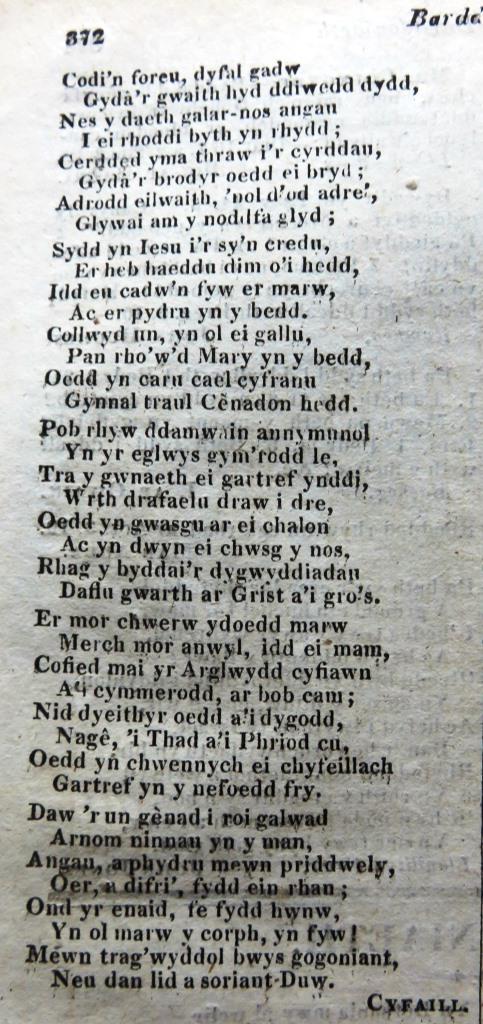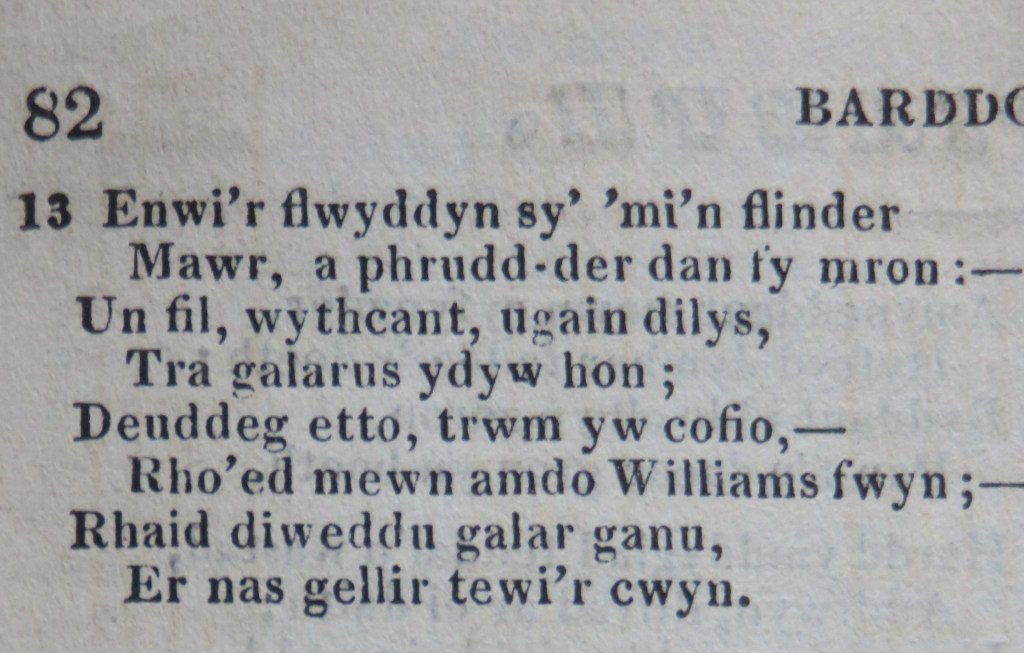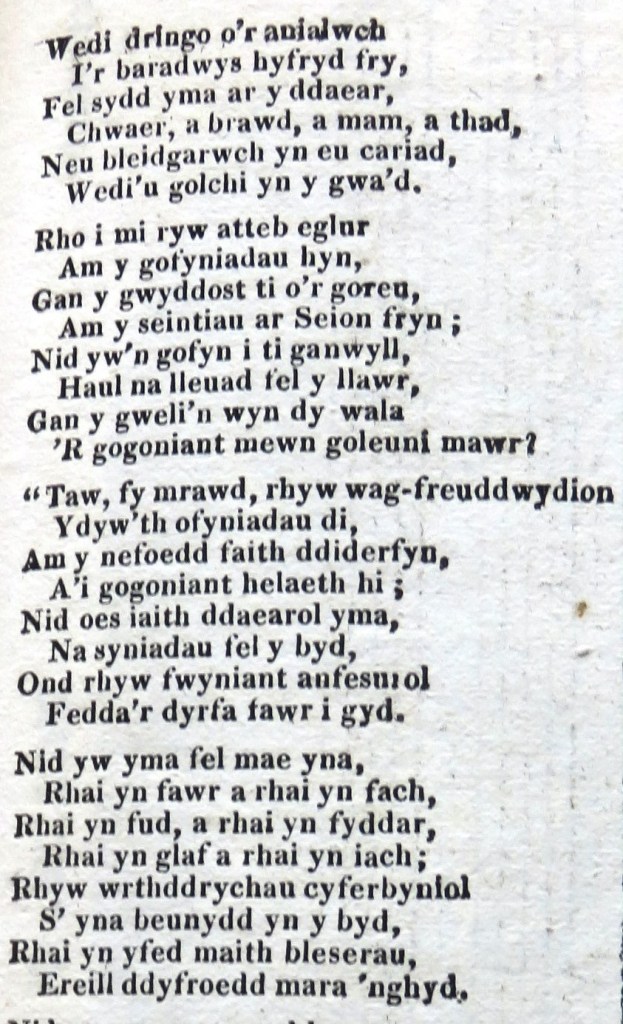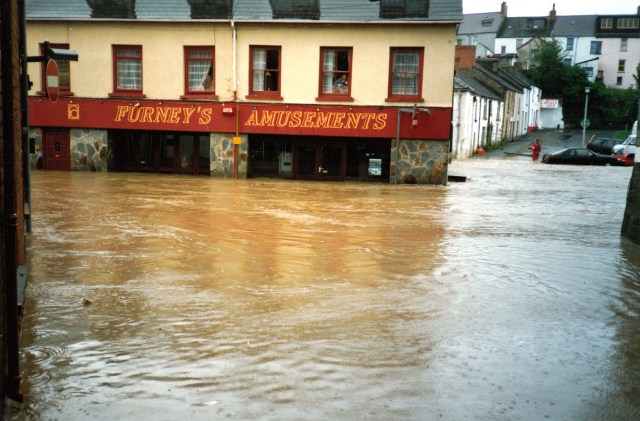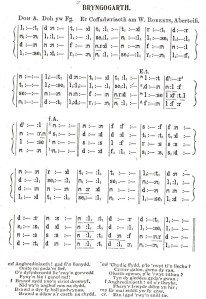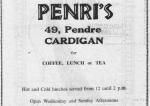
Category: Bethania
Cardigan People 36: Mary Davies (d. 29.7.1829)
Cardigan People 35: S. Williams (1777–17.1.1832)
S. Williams, merchant who died in 1832, a few years before the first Census in 1841. A prominent Baptist in the town. No indication where he was buried.
Cardigan People 33: Mary Phillips (1770–1830)
Greal y Bedyddwyr, 1830
Cardigan People 31: Revd John Herring (1789–1832)

Revd John Herring was the minister of Bethania Chapel from 1811 until 1832. He died after an illness that lasted some months. He left a wife and 7 small children. What else do we know about him?
The piece in the Dictionary of Welsh Biography can be read here:
https://biography.wales/article/s-HERR-JOH-1789
Well there is a story that one fine summer’s day in July while he was on one of his preaching tours in north Wales, he met the famous Revd Christmas Evans who took one look at him and said “What a strange thing to see a herring on top of a mountain”. Quick as a flash Herring replied “ Surely not more than to see Christmas in the middle of summer?” Touche as they say.
In another version the two were on top of the Frenni Fawr. By 1909 the story had changed a bit:
Christmas Evans and John Herring meet. When Mr Herring saw his friend, he shouted ‘Strange, strange, to come across Christmas in the middle of summer.’ ‘Yes, it is’, replied Mr Evans, ‘but stranger still to meet a live herring on top of a mountain.’
His unusual surname was an opportunity for many a story: Once, down in Llanboidy, he was preaching so eloquently that Mr. Powell, Maes-gwyn, a prominent local man asked ‘Who is that? ‘Herring, Cardigan’ was the reply from someone sitting nearby. ‘No, not a herring, he said but a Salmon.
But there is more to the Revd John Herring than an unusual surname.
In 1836, four years after his death D. Roberts, Llandiloes, published a booklet entitled: Derwen Wylofain.

The short biography included reveals a little of his background:
John was born to Thomas and Sarah Herring, Llanyspyddyd, Breconshire in 1789. His father died when John was 4 or 5 years old. His mother remarried and the family moved to the iron works at Ebbw Vale. John was employed at the local blacksmith.
His humorous character was revealed early on. ‘How many sects are there?’ he asked his employer one morning.
‘I think there are five of any use, and those five are in our house. My stepfather is Indepenent, my mother a Methodist, I will go to the Quakers and I’ll make my cat a Wesleyan and the little dog a Baptist’. Indeed he took his dog with him one Sunday morning to see a baptism in the Sirhowy river by Tredegar deciding to throw the dog in the river when the Revd Edward Davies was preaching. But it was not to be. Listening to the sermon he became a believer and it was he who was baptised and not the dog. He became a member of the Baptist Church at Tredegar in 1804. [Siloh says Revd. B. James (Edwards, Bethania, p. 30)]
The rest, as they say, is history…
He began preaching when he was 16 years old. Under the influence of the Revd John Hier, Basaleg, he was accepted as a student in the Colege at Bristol when he was 20/21 years old. He had had enough after a year. ‘What is the use of Hic, Haec, Hoc, to save souls’
On a preaching tour he was invited to Bethanis and accepted a calling in 1811. He remained there until his death in 1832.
- He was an exceptional preacher.
“he was one of the funniest and most popular preachers of his day”
“he was possessed of a prolific understanding, a multitude of words, a natural and effective eloquence, a tenacious memory, proper gestures, a melodious voice
But he wasn’t a perfect man ‘despite his excellent qualities he was not without his weaknesses’ (these are not listed).
- He was an excellent organiser. He drew up a list of rules and regulations on to how to organize a Church in a pamphlet entitled: ‘‘Penderfyniadau i’w gosod mewn gweithrediad yn Eglwys y Bedyddwyr yn Methania, Aberteifi, a fabwysiadwyd mewn Cyfarfod a gynhaliwyd Tachwedd 18fed, 1829,’ [Decisions to be undertaken at Bethania Baptist Church, Cardigan, and adopted in a Meeting held on 18th November, 1829’]. He elaborated on many issues: Covetousness–its harm; Generosity–its appeal; Ministers–their maintenance; The Poor–how they should be considered; Discipline–its rule; the neglect of assembling.
- He was a litterateur: He edited the Greal y Bedyddwyr for a year, and then for a further two years with J. M. Thomas.
He died at Llwynpiod, Cardigan on 2 April 1832, after an illness that had lasted some months. He was buried at Cilfowyr.
He married twice. First to Elizabeth, the daughter of the Revd Griffith Davies, minister of Rehoboth. She died in 1823 leaving three daughters: Mary, Elizabeth and Anne. His second wife was another Elizabeth (Lewis, Crugmor.) They had four children from this marriage.
His second wife died a fortnight after John leaving seven orphans – among them:
Ann, 12 year old (blind and of unsound mind); Dinah, 8 year old (later married James Morse, Trehowell); James, 7 year old. He is listed in 1901 as a retired mariner and living in Northgate Tce. He had married the daughter of the Revd. T. J. Morris and was a member of Capel Mair. He died in 1907; Sarah, 4 year old; Eleanor 2 yea rold. She is listed in 1851 as a housekeeper in Quay St; in 1861 as a housemaid in St Mary St (to Thomas Morgan, solicitor). She was a member at Bethania and died in 1898.
A number of prominent people from the chapel and surrounding district established a fund to help the children.
David Mathias, Cardigan
Timothy Thomas, the elder
William Richard, Penyparc
Daniel Davies (Independent minister), Cardigan
John Morgan, Blaenffos
Daniel Davies, Swansea
Awdl Bryddest Farwnadol i’r diweddar Barch. John Herring, Aberteifi: An elegy to the late Revd John Herring, Cardigan by Asaph Glyn Ebbwy (Thomas Williams, Tredegar). Please see the Welsh version for the 30 verse elegy!
Cardigan People 24: Owen Roberts, Feidrfair, sailor, cook (1848–1904/05)
A note in Bethania Chapel Minutes first brought Owen Roberts to my attention. Under a list of deaths for 1905 is the following:
Owen Roberts, Feidrfair. Hwyliodd o China i Vladivostock Hydref 1904. Ni chlywyd dim oddi wrthynt drachefn yn yr SS Claverdale.
[He sailed from China to Vladivostock in October 1904. Nothing more was heard of them in the SS Claverdale]
A bit of Googling revealed a few interesting items.
Under the heading ‘Fate of the Claverdale’ the Evening Express published the following account on 31 January 1905:
A boat belonging to the overdue British steamer Claverdale has been picked up and taken to Fukuyajna. None of the crew was on board. The Claverdale left Barry on September 1 for Manila, with a cargo of between 5,000 and 6,000 tons of coal on Russian account. On October 29 she was reported at Sabang, and on November 23 left Hong Kong for Vladivostok. Nothing has been heard of her since, and it is presumed that in running the blockade she kept in too close to the land and struck a sunken rock. Captain Thomas, the master of the Claverdale, is a native of Cardigan, and is well known in Cardiff shipping circles.
The Claverdale was the pioneer ship of the Claverdale Steamship Company (Limited), owned by Messrs. E. Haslehust and Co., who claimed that this is the first vessel they had lost. She was built in 1899 by Messrs. Graig, Taylor, and Co., of Stockton-on-Tees, is 330 feet long, with a 45 feet beam, and a draught of 18 feet, while her engines registered a nominal horse-power of 278.
[Correction gratefully received from Mr Reg Nash: “the Claverdale Steamship company, owned by E. Haslehust (not Hazelhurst) and Co., had two ships called the Claverdale. The one you mention was sold in 1903 and replaced by a second, built by J. Priestman & Co. of Sunderland. This new Claverdale was launched on May 31 1904. She was 345 feet long and 48.8 feet in beam, with a draught of 20.9 feet; her nominal horsepower was 357 (National Archives BT 110/116/30). I have a copy of the blueprint plans, courtesy of the National Maritime Museum. It was her maiden voyage that ended so tragically.]
By 09 September 1905 the Cardiff Times reported that a Vladivostok telegram dated August 31st stated that a steamer stranded north of Olga was reported to be the missing British s.s. Claverdale, bound from Cardiff to Vladivostok via Hong Kong.
But further inquiries found that the rumour was not true and the reporter on the Cardiff Times was not happy:
This is the second time that such a report has been cabled home from Vladivostok respecting the same ship, and it is unfortunate that the authorities do not make an effort to secure the name of the stranded vessel before telegraphing to England.
The mystery of the missing ship seemed to have been solved by November 1905, according to a report in the County Echo, quoting the Daily Chronicle:
Dispatches received in London reveal for the first time the identity of the wreck which has frequently been sighted to the south of Vladivostok, near the mouth of the Tandse River. The vessel turns out to be the British steamer Claverdale, which left a Chinese port last November with a full cargo of coal for the Russian cruisers at Vladivostok, and which has not since been heard of. As the result of a visit paid to the stranded steamer, it has been ascertained that the vessel has been pillaged by the natives in the neighbourhood, and every article of value taken away. The inhabitants residing in the vicinity, who were interrogated, declared that the crew of the Claverdale’ were removed shortly after the wreck by two boats presumed to be Japanese.
But the missing crew remained missing : Neither owners nor relatives, however, have heard from any of the men. By November 1905 the headline in the Weekly Mail suggested that worse was to come.
WRECK OF THE CLAVERDALE: SUPPOSED MURDER OF MEMBERS OF THE CREW.
The crew who are supposed to have been killed on the Manchuria coast, where the ship was wrecked, included:
H. H. Thomas, Cardigan, commander;
D. Llewellyn, St. Dogmaels, mate
James Reed, Swansea, second mate
D. Jones, Cardiff, carpenter
J. S Campbell, Sunderland, steward
Owen Roberts, Cardigan, cook
Watkin Evans, second steward
John Waddle, boatswain
A. Tripolis, A.B. seaman
R. Thomas, Liverpool, A.B. seaman
G. Marromatic, A.B. seaman
Frederick Cooper, Sunderland, chief engineer
Frederick Walker, second engineer
James Beadle, Sunderland, third engineer
Cornelius Gray, Sunderland, fourth engineer
Carl Lundin (of Sweden), donkeyman
Richard McGuire, Bootle, fireman
B. Mynes, Brumiskin, fireman
W. Flagg, fireman
Gus Langer, fireman
R. J. Jones, fireman
S. Ostovski, fireman
W. Howrie, apprentice
G. B. McLaren, apprentice
Reginald Turner, North-street, Lewes, apprentice
G. A. Saunders, Kingston-road, Portsmouth, apprentice
In addition to these, two other hands, names and nationalities unknown, were taken on to Hong Kong. These were possibly Chinese.
[Additional information from Mr Reg Nash: Of the 27 to 30 men on board (sources differ) when she was lost four were from Cardigan:
Captain Thomas, aged 52, of Priory Street, Cardigan. He had previously lived at Ovingham House, Llangoedmore. (His widow, Laura née Morris, was the long-time headmistress of Llangoedmore School; her obituary is on page 1 of the Cardigan and Tivyside Observer dated 23/10/1925).
D. Llewellyn, the mate, aged 47, was born in St. Dogmaels, which is also given as his address (no further details).
Owen Roberts, the cook, aged 56, was born in Holyhead, and his address is given as 26 Mary’s Crescent, Cardigan.
David Jones, the carpenter, aged 43, was also born in Cardigan, but his address is given as 172 Corporation Road, Cardiff.]
It was claimed that the ship had been boarded by Manchurian pirates and the crew thrown overboard.
In March 1906 the Cardiff Times reported on the proceedings of the Probate Court where the captain named as Edward Evan Thomas, Llangoedmore was presumed dead:
The vessel was found 450 miles north of Vladivostok ashore in the Gull of Tartary deserted, with her decks dismantled. In February, 1905, a boat belonging to the ship was found, and in May the ship was posted at Lloyd’s as a total loss. Eventually the vessel was discovered a total wreck, and only about 300 or 400 tons of cargo remained. The master and crew had disappeared. Captain Thomas left about £1,400. His Lordship granted leave to presume the death of Mr Thomas accordingly.
[Further details from Mr Reg Nash: When the Claverdale reached Hong Kong it was revealed that she would be going on to Vladivostok, which was being blockaded by the Japanese during the Russo-Japanese War. Several ships had already fallen victim to the blockade. Consequently the crew, who had been hitherto unaware that they would be sailing through a war-zone, were given the option to leave the ship. Seven men did so including David Jones, the second mate, aged 29, born in Cardigan, address 1 Greenfield Row, Cardigan; there is a brief interview with him on page 2 of the Cardiff Evening Express dated 12/1/1905. As to the fate of the Claverdale I have little to add. It seems pretty certain that to avoid the Japanese blockade she took the much longer route to the east of Japan and was thus having to negotiate the la Perouse strait and approach Vladivostok from the north. Possibly her rudder was put out of action in the hostile winter environment, as happened to at least one other vessel at this time. The precise location of the wreck is also a mystery. Contemporary reports, including one from the Salvage Association, say that she was found at the mouth of the Taudse (or Tandse?) River, north of Ternei Bay, but I have been unable to discover a river of that name.]
After all this we’re none the wiser, I’m afraid, as to what actually happened but suffice to say these brave local sailors probably came to a watery end: H. H. Thomas, Cardigan, D. Llewellyn, St. Dogmaels, and Owen Roberts, Cardigan, the cook from Feidrfair.
If a photograph exists of any of these gentlemen I would be pleased to add a copy here.
25 December (1176, 1888, 1889, 2103) Merry Christmas to all who were born within the sound of the bells of St Mary’s
-
25 December (Wed.) 1176 The first Eisteddfod
And then the Lord Rhys held a special feast at Cardigan, and he set two kinds of contests: one between the bards and the poets, and another between the harpists and the crowders and the pipers and various classes of string-music. And he set two chairs for the visitors in the contests. And those he enriched with great gifts. And then a young man from his own court won the victory for string-music. And the men of Gwynedd won the victory for poetry. And all the other minstrels received from the Lord Rhys as much as they asked, so that no one was refused. And that feast was proclaimed a year before it was held throughout Wales and England and Scotland and Ireland and many other lands.
1176 Brut y Tywysogyon
- 25 (Tues.) 1888
CAPEL MAIR
A very successful concert was given in Capel Mair, in this town, on Christmas night, under the presidency of the Rev. W. Jones (Mayor). The building was well-filled, and excellent order was maintained throughout by the conductor, the Rev. T. J. Morris, which was certainly not the least pleasing feature of the gathering. The programme was contributed to by a number of local amateurs, assisted by Eos Myrnach, and a male party from Llanfyrnach, and it will not be considered invidious to say that it was in a great measure owing to their valuable assistance that the concert was one of the best that has been given in the town for some time.
Eos Myrnach possesses a capital voice, and sang several high-class songs with excellent taste and feeling. His rendering of “Alone on the raft” was particularly deserving of mention.
The Llanfyrnach male party, too, proved a great acquisition, and gave evidence of close and careful training, and their rendering of the choruses allotted to them was admirable. “Comrades Song of Hope,” and “Martyrs of the Arena” — the latter including a splendidly rendered quartet- fairly delighted the audience, and were deservedly encored. Mr. Davies led the Llanfyrnach party in the first chorus, and Eos Myrnach afterwards.
Among the locals, the Capel Mair party, led by Mr. Reynolds; Mr. W. Thomas and party, Mr. D. Charles and friends, and Mr. D. Davies and friends, were deserving of commendation, as were also Misses Lowther and Letitia Evans, and Mrs. Jones, and Messrs. W. Thomas, D. Thomas (Tyrhos), and T. Lewis. Miss Daniel and Miss Edith Daniel accompanied with much taste throughout the evening.
The following is the programme:
- Pianoforte duet, The Little Sailor, Misses Daniel and Lowther;
- glee, Croeso’r Boreu, Capel Mair Party;
- solo, Gitana, Miss Lowther;
- glee, “Beautiful Rain,” (encored and repeated) Mr. W. Thomas and party;
- solo, “Llwybr yr Wyddfa,” (encored and sang Bwthyn bach melyn fy Nhad”)
- Eos Myrnach quartet, “Geiriau Mam,”
- Mr. D. Charles and friends solo,
- Mr. D. Davies solo, Baban diwrnod oed,” (encored)
- Mr. D. Thomas, Tyrhos .Song, Darby and Joan,”
- Miss Letitia Evans chorus, “Comrades Song of Hope,” (encored)
- Llanfyrnach Party solo, Jerusalem,”
- Mr. T. Lewis; duet, “As it fell upon a day,”
- Misses Lowther and Evans. Part 2-Glee, Yr Haf,”
- Capel Mair Party duet, O Gartref yr Eryr,” (encored and sang a duet from Blodwen “)
- Eos Myrnach and Mrs Jones solo, Hen Ffon fy Nain,” (encored)
- Mr. D. Thomas, Tyrhos; solo, Alone on the Raft,” (encored)
- Eos Myrnach; chorus, “Y Gof,”
- Llanfyrnach Party; solo, Pleser-fad Niagara,”
- Mr. W. Thomas;
- trio, Tri Chymro,” (encored)
- Mr. D. Davies and friends; chorus, “The Martyrs of the Arena,” (encored)
- Llafyrnach Party
- finale, Hen Wlad fy Nhadau,” air by Eos Myrnach and chorus by the audience.
Votes of thanks to the Chairman and those who took part concluded the proceedings (probably early Boxing Day!)
- 25 (Wed.) 1889
BETHANIA CONCERT
A grand evening concert was given in Bethania Chapel on Christmas night, and there was a crowded audience. A letter was read from Mr. Morgan-Richardson, Noyadd-Wilym, who had been announced to preside, regretting his inability to attend, and inclosing £2 towards the funds. In the absence of the chairman, Mr. W. Lewis, Brecon Old Bank, was unanimously voted to the chair. The Rev. T. J. Morris acted as conductor.
The following was the programme :
- Pianoforte solo, Miss Gwynne, R.A.M. solo, “Baner ein Gwlad,”Gwyn Alaw” (encored, and responded with “My Pretty Jane”);
- solo, “Remember me,” Miss S. A. Esau;
- solo, Death of Nelson,” Mr. Wm. Thomas (encored, and responded with a Welsh song);
- solo, The Blind Girl to her harp,” Miss S. A. Jenkins (encored, and responded with “Trip, Trip”);
- solo, “I had a dream,” Mrs. S. A. Owen;
- solo, The White Squall,” Mr. W. Jones
- solo, “O dywed im’, awel y Nefoedd,” Llinos Gwent;
- solo competition, “Mair Magdalen,” ten competed, three singing on the stage, the best being Miss Lizzie Jenkins, Greenfield-square
- duet, Martial Spirit,” Gwyn Alaw and Mr. William Thomas;
- juvenile choir competition, Y Galwadau,” three choirs, namely, Bethania (led by Mr. William Jenkins), Tabernacle (led by Mr. John James), and Mount Zion (led by Mr. D. Ivor Evans), and the prize was divided between Bethania and Mount Zion
- choirs quartet, Mount Zion Party duet, “Howel, Howet, Llinos Gwent and Gwyn Alaw (encored, and repeated);
- solo, Pleserfad Niagara,” Mr. William Thomas;
- solo, Good Shepherd,” Gwyn Alaw
- solo competition, Y Morwr Lion,” five entries, prize awarded to Mr. William Jones
- choral competition, Cwynfan Prydain,” two choirs competed, namely, Tabernacle (led by Mr. E. Ceredig Evans), and Bethania (led by Mr. William Jenkins), and the prize was awarded to Bethania Choir
- song, Aunty,” Llinos Gwent (encored, and responded with The Donkey Cart”)
- finale, Hen Wlad fy Nhadau.”
It is but fair to say that the singing of Miss S. A. Jenkins (Llinos Gwent) was much admired she possesses a beautiful soprano voice of great power and compass, and should have a great future if she becomes a professional singer. Votes of thanks to the Chairman, Mr. Morgan-Richardson, the Conductor, Miss Gwynne (the accompanyist), and the singers, concluded the proceedings.
- 25 1888 (Tues.)
THE WORKHOUSE.
On Christmas Day the inmates of the Workhouse were, as usual, through the generosity of Mr. Brigstoike, the much respected chairman of the Board of Guardians, treated to a splendid dinner, composed of roast beef, plum pudding, and beer, with two ounces of tobacco to those who smoked, and oranges to those who did not, and to the women and children.
Mr. Thomas Llewelyn and Mr. Lewis Davies superintended the distribution. A hearty vote of thanks to Mr. and Mrs. Brigstocke for their kindness, to Messrs. Llewelyn and Davies for superintending, and to the master and matron for the great trouble they had taken in preparing the good things, were unanimously passed.
Dinner being over, Mr. John James, St. Dogmells, and his choir, attended, and several pieces were sung, to the great delight of the inmates.
- 25 1909 Bethania
- 25 (Wed.) 2013 Tonight it’s Downton Abbey v. Mrs Brown’s Boys Christmas Special (Progress or what?)
MERRY CHRISTMAS TO ALL WHO HAVE READ THESE SNIPPETS OVER THE YEAR.
Next year – more meat on these bones!
12 December (1986) Floods in the Mwldan again!
17 October (1880) Ten baptised in the Teifi
- 17 1880 (Sun.) Ten persons were baptised in the river Teifi, at the Netpool, by the Rev. J. Williams, minister of Bethania Baptist Chapel, on Sunday afternoon last, in the presence of a large concourse of people. They were:
Griffith Griffith, son of Thomas Griffiths, grocer, Pendreuchaf; John Williams, son of William Williams, carpenter, Pendre isaf; David Jenkins, son of John Jenkins, waggoner, St. Mary’s St; James Thomas, sailor, Feidrfair; Anne Davies, daughter of Thomas Davies, a worker at Parcytrap; Anne Thomas, daughter to the wife of John Jenkins, stonemason, Pendre uchaf; Rachel Griffiths, daughter of John Griffiths, tinman, St Mary’s St; Frances Heyes, White Hart, St Mary’s St; Anne James, daughter of David James, Eben’s Lane and Margaret Jones, maidservant Mr Levi James, the ironmonger.
25 September (1842) Baptist Mission services at Bethania
- 25 1842 (Sun.) Baptist Mission: Sermons preached by the Revd W. Jones, Frome and Revd John Williams, Newtown at Bethania Chapel.
12 September (1953) Visit of Gladys Aylward
- 12 1953 (Sat.) Visit of Gladys Aylward to Bethania at 7pm
- 12 1952 (Fri.) Cardigan and Soroptomists Club founded
13 August (1799) Death of William Williams, minister at Bethania
- 13 1799 (Tues.) Death of the Revd William Williams JP, minister at Bethania (1774–1799)
6 July (1975) Singing Festival for ’76 Eisteddfod
18 June (1880) Revd John Williams begins his ministry at Bethania
- 18 1760 (Sat) 1st official meeting of the Sea Sarjants, in the Long Room, Black Lion.

- 18 1880 (Fri.) Revd John Williams begins his ministry in Bethania. He arrived in Bethania from Birkenhead. A native of Llansadwrn, he was a popular minister and a prominent individual in the political life of the town and county. He became a member of the Cardigan School Board in 1882, and a chairman of that body ten years later. In 1895 – a year before the new school opened – he became a chairman of the Board of Governers of the Secondary School and he remianed so until his resignation in 1913. He was elected again in 1929. He became a county councillor shortly after the establishment of the County Council in 1889 and he was a chairman twice, in 1894–5 and again in 1914–15. He was elected alderman in 1916. He served on almost every committee on the County Council and he was chairman of the education committee for three consecutive years and a chairman of the police committee twice. He was also a member of the Court of Aberystwyth and Cardiff colleges for many years. In 1903 he became a member of the Board of Guardians and from 1911 onwards was the chairman. He was also chairman of the Cardigan and District Education Committee and a chairman of the local Pension committee. He served as a JP for many years.
He also climbed the ranks within the Baptists and achieved presidency of the Baptist Union of Wales in 1905. He was a staunch Liberal and when he died in 1929 the officials of Bethania received a telegram from the former Prime Minister David Lloyd George:
‘Deeply regret to hear of the death of my old friend, Rev. John Williams … It will be a real loss not only to Cardiganshire but to Liberalism throughout Wales.’
Revd John Williams was probably one of the most influential person in Cardigan during the end of the 19th century and the first decades of the 2oth century.
8 June (1946) Celebrating peace in Europe and the Far East
- 8 1946 (Sat.) Civic Service at Bethania to celebrate peace in Europe and the Far East
16 May (1970) Roberts, newsagents closing
- 16 1970 (Sat.) J C Roberts shop closing (High St. newsagents)
- 16 1968 (Thurs.) Gŵyl Fawr Aberteifi: Concert: Ryan Davies and Bryn Williams; Margaret Williams; Y Pelydrau; Bois y Ferwig; Cardigan Junior School Choir.
- 16 1900 (Wed.) New Bethania Organ opened by Dr. Roland Rogers, Bangor organist
28 April (1197) Death of Lord Rhys; (1938) Visit of Amy Johnson
- 28 1985 (Sul) Celebrating the Centenary of local Baptists’ Cymanfa Ganu
- 28 1951 (Sad.) Mammoth Boxing Tournament: Market Hall on Barley Saturday. Popular Cardigan boxer Haydn Gwyon, and Owen Edwards, who is due to appear at Albert hall in final of British Railways Championship.
- 28 1938 (Thurs.) Amy Johnson passes through Cardigan as part of RAC Car Rally.
- 28 1197 (Mon.) Death of Lord Rhys
25 April (1949) Cardigan Town AFC v Swansea AFC
- 25 1949 (Mon.) Cardigan Town AFC v Swansea AFC. KO at 6.00 p.m. Anyone remember the score?
- 25 1949 (Mon.) Funeral of Revd Esaia Williams, Bethania
20 April (1949) Handel’s ‘Messsiah’ at Bethania; death of Revd Eseia Williams
20 1949 (Wed.) Handel’s Messiah at Bethania. Soloists included Jennifer Vyvyan; Gwyneth Morgan; Trefor Anthony; and Hubert Hughes; Idris Griffith, Llanelli, organist; Conductor Andrew Williams. Notable especially for the collapse and death of Revd Esaia Williams, Bethania in the pulpit while addressing the congregation.
9 April (1958) Unveiling a memorial to Revd Esaia Williams, Bethania

(30 October 1889–20 April 1949)
- 9 1958 (Mer.) Services to unveil a memorial to the Revd Esaia Williams at 2.00. In the evening sermons by Revd Humphrey Ellis, Caernarfon and Revd John Thomas, Blaenywaun
- 9 1949 (Sat.) Parade of Vehicles by Territorial Army. The 1584 (G.T.) County RASC (TA) – 3 ton lorries, armoured cars, breakdown vehicle, motorcycles & workshop equipment.
- 9 1842 (Sat.) Triton set sail for Quebec
6 April (1912) Death of composer of Bryngogarth
- 6 1988 (Wed.) Death of Wyn Jones, author
- 6 1951 (Fri.) Cardigan Society’s First venture: ‘The Long Mirror’
- 6 1912 (Sat.) Death of Williams Roberts, composer of Bryngogarth
William Roberts (1862–1912)
[The notes below are based on a biography written by Revd Esaia Williams, 19 April, 1935 CTA]
William Roberts was born on 1 October 1862 in a house called Farmers’ Arms, Bridge St., Cardigan. [ 21 Castle St.]. His father, John, was a native of Cardigan, raised up in St Marys St. A sailor by trade he spent his life at sea. His mother Mary, was originally from Rafael, near Blaenffos. They had four children: Mary Ann, another William who died young, Sarah Lizzie and William. Their mother died young and the children were brought up by their aunt Mrs Martha Roberts.
William was of small stature, a result of a childhood accident. He received his early education at the British School held at the old Bethania Chapel (Central Café). Edward Penfelyn (Iorwerth Penfelyn) was his schoolmaster, an exceptional man.
After leaving school William Roberts was apprenticed as a furniture maker with Griffith Griffiths, Castle St. He worked some years with David Lewis, Llanifor, Penparc, opposite the Eagle Inn, but because of his frailty he had to give up work as a carpenter. He eventually opened a shop in Bridge St. and remained there for the rest of his life. The shop, opposite Quay St. was taken down c. 1933.
William Roberts was not noted for his public skills, but ‘no-one was more faithful in church. One of the dearest, harmless and gentlest of souls, but when called upon to stand on a principle, he could be as brave as a lion, and loud in his protest against sin in all its manifestations’.
He excelled as a musician. In 1882 some of the musicians in Bethania Chapel invited Mr Benjamin Lewis, Blaenannerch to arrange a sol-fa class. William Roberts joined. By the end of the season every member of the 50 plus class was able to read any tune at the first reading. Benjamin Lewis later migrated to America. After taking an interest in music he continued to study. His first instrument was a fife, then a fiddle. A travelling Italian wandered through Cardigan one day and was playing a harp. The music reached William Roberts’ ears and he managed to strike a bargain and persuade the Italian to part with his instrument. He then began to compose. He and others used to walk to Cilgerran to learn composition with the Revd W. Cynon Evans and his wife. (They later moved to Blaencwm, Rhondda). He was a founder member of the town’s orchestra. He was a faithful member of the Cardigan Male Voice Party, under the leadership of William Thomas, Carningli.
William Roberts’ compositions included Bryngogarth, Blaenffos, Glanteifi, Llandudoch, Rhosgerdd, Cemaes, Bridge Street and William
For Children: Clodfori’r Gwaredwr, Dewuch ataf fi, Annwyl Iesu. The work he is best remembered for is Bryngogarth.
When the Revd John Williams, Bethania was returning from a service in Pembrokeshire late one evening he noticed a light on with William Roberts, and when he passed the window he tapped it with his whip. The following morning he went to visit William Roberts, and said: ‘What were you doing down so late at night? O! Mr Williams it was you. To tell truth I was putting the finishing touches to a tune on the words: ‘Anghrediniaeth, gad fi’n llonydd’
That tune was then called Bryngogarth after the Revd John Williams’ house in Napier Street.
William Roberts died 6 April 1912 aged 50 years, and was buried in Blaenffos cemetery.
2 April (1832) Death of Revd John Herring, Bethania at Llwynpiod
- 2 1949 (Sat.) 11.30 a.m. Open air meeting of the Cardiganshire Labour Party in Morgan Street. Speakers included A. G. Waite, prospective candidate for Oswestry; Dr A. W. Spencer, president of the Carmarthenshire Labour Party; Iwan Morgan, prospective candidate for Cardiganshire Labour party.
- 2 1949 (Sat.) Funeral of William Phillips, Pendre at 93 yrs old. He retired at 87 as Head gardener with Mr Berrington Davies, Castle Green and Plas Llangoedmore. Member of Tabernacl. Buried at Llantood.
- 2 1832 (Mon.) Death of Revd John Herring, Bethania, 43 years old, at his home in Llwynpiod. He was buried at Cilfowyr Friday 6 April. He left a wife (who died shortly afterwards on 22 April) and 7 children.
14 March (1927) Birth of G. Berwyn Williams
- 14 1927 (Mon.) Birth of G. Berwyn Williams MBE, teacher, headteacher at Brongest School. shopkeeper (Hardware Stores); mayor 1973–4; chairman of the National Eisteddfod committee 1976; High Sheriff of Dyfed 1988–9; deacon and secretary of Bethania Chapel. He died in April 1990.
27 February (1970) Bethania Young People meet George Thomas
- 27 1970 (Fri.) Bethania Young People visit Cardiff to see Chitty Chitty Bang Bang. On the Sunday who should come and meet them in Llandaf Road Baptist Chapel but George Thomas the Welsh Secretary of State for Wales and said: ‘ I expect you finished the milking before you came down’?!
- 27 1953 (Fri.) Concert at Tabernacl: Pontyberem Male Voice Choir and tenor Geraint Davies.
23 February (1960) Cliff Richard visits Penri’s cafe
- 23 1960 (Wed.) Visit of Cliff Richard. He called in at Penri’s café, Pendre (Happy City 2013), and was offered Welsh cakes for the first time, which he thought ‘scrumptious’. No record whether it was raining on that occasion so no evidence whether he sang during his visit.
- 23 1949 (Wed.) Cardigan Choral Society – Handel’s ‘Messiah’. Bethania, conducted by Andrew William; Artistes included: Elsie Suddaby, Bruce Dargavel, Eileen Price, Rene Soames. The organist was Professor Ted Morgan.
- 23 1928 (Thurs.) Burial of Samuel Young, 77 mayor in 1908 and 1921
22 (1950) Cardigan Choral Society performs ‘Judas Maccabeus’
- 22 1950 (Wed.) Cardigan Choral Society performs ‘Judas Maccabaeus’ at Bethania.
20 February (1878) A lecture on ‘Handel’
- 20 1878 (Wed.) Lecture in Bethania: ‘Handel’ by Revd W. Harries, Aberdare. The proceeds went towards the Baptist chapel at Cilfowyr. The reviewer wrote that the lecturer ‘showed considerable ability of composition’, so there..
12 January (1964) Fire at Bethania
- 12 1964 (Sun.) Fire at Bethania under the chapel where the boiler was housed.
- 12 1910 (Wed.) General election: Public meeting at the Guildhall Vaughan Davies MP; Prof Levi, Aberystwyth; D Davies, Treforgan, Revd. J D Hughes, Blaenwaun. Chairman: Revd. John Williams, Bethania.
- 12 1876 (Wed.) Dr. William Lane Noot, surgeon, died, aged 71.
1 January (1916) Calennig at the Pav
Happy New Year! Here we go! Gems will be revealed during the year!
- 1 1916 (Sat.) New Mayor D Timothy James, Gwalia 1st mayor to give the town’s children a free cinema show as a New Year treat (Calennig).
- 1 1888 (Sun.) Club for gentlemen opened at 22 St Mary’s St.
- 1 1873 (Wed.) Presentation to Revd Evan Thomas, Bethania on his departure to Carmarthen.
- 1 1631 (Wed.) Birth of Katherine Phillips, later of Cardigan Priory.


